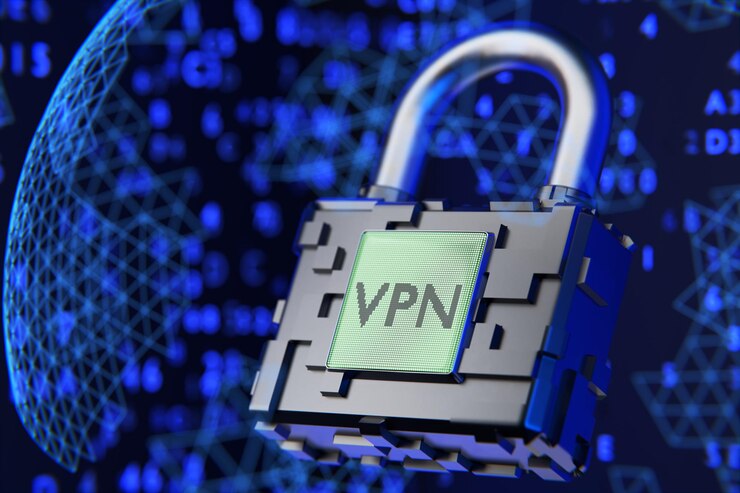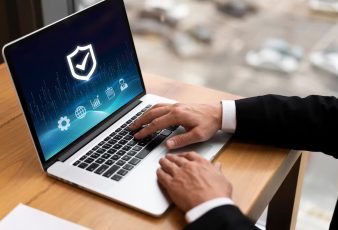A Virtual Private Network (VPN) is a technology that allows you to create a secure and private connection to the internet.
It works by encrypting your internet traffic and routing it is a remote server, hiding your IP address and location from anyone trying to monitor your online activities.
VPNs are commonly used for privacy and security, allowing users to protect their personal information and online activities from prying eyes, such as hackers and governments. VPNs can also bypass censorship and geo-restrictions. It gives you access to websites and online services that may be restricted in your location.
With a vpn, you can enjoy a more secure and private internet experience, protecting your sensitive information and online activities from cyber threats and surveillance.
How Does A VPN Help Revamp Cybersecurity?
VPN offers an encrypted funnel through which you connect to the online world. This funnel protects you from any potential harm. Below are a few ways in which VPN helps revamp your cyber security.
👉Encryption

Encryption is one of the key ways that a VPN helps revamp cybersecurity.
Here’s how:
- Protects Sensitive Information: By encrypting your internet traffic, a VPN protects your sensitive information, such as passwords, financial data, and personal details, from being intercepted or stolen by cybercriminals.
- Prevents Eavesdropping: A VPN encrypts your internet traffic, making it difficult for anyone to monitor or intercept your online activities. This includes your internet service provider (ISP), government agencies, and hackers.
- Secures Public Wi-Fi: If you frequently use public Wi-Fi, a VPN can help secure your internet connection and protect you from cyber threats such as man-in-the-middle attacks and Wi-Fi sniffing.
- Enhances Privacy: Encryption helps enhance your privacy by making it difficult for anyone to monitor your online activities or track your location.
A VPN can provide a more secure and private internet experience, protecting your sensitive information and online activities from cyber threats and surveillance.
👉Hide IP Address

Hiding your IP address with a VPN can help revamp cybersecurity in several ways:
- Protects Against Cyber Attacks: By hiding your IP address, a VPN makes it difficult for hackers to target you with cyber-attacks or exploit vulnerabilities in your network.
- Enhances Privacy: Hiding your IP address helps enhance your privacy by preventing websites, advertisers, and governments from tracking your online activities or location.
- Bypasses Censorship: A VPN can help bypass government censorship and access websites and online content that may be restricted in your location.
- Prevents Online Tracking: Hiding your IP address makes it more difficult for online advertisers and tracking companies to track your online activities, protecting your privacy and preventing targeted ads.
Hiding your IP address with a VPN protects your online activities and personal information from cyber threats and surveillance.
👉Secure Public Wi-Fi

Securing public Wi-Fi with a VPN can help revamp cybersecurity in several ways:
- Protects Against Man-In-The-Middle Attacks: Public Wi-Fi can be vulnerable to man-in-the-middle attacks, where hackers intercept your internet traffic and steal sensitive information. A VPN encrypts your internet traffic, making it difficult for anyone to intercept or monitor your online activities.
- Prevents Wi-Fi Sniffing: Public Wi-Fi can also be vulnerable to Wi-Fi sniffing, where hackers use specialized software to monitor your online activities. A VPN encrypts your internet traffic, making it difficult for anyone to monitor or intercept your online activities.
- Enhances Privacy: A VPN helps enhance your privacy by encrypting your internet traffic and hiding your IP address and location from anyone trying to monitor your online activities.
- Secures Sensitive Information: If you use public Wi-Fi to access sensitive information, such as financial data, a VPN can help protect your sensitive information from being intercepted or stolen by cybercriminals.
Using a VPN to secure public Wi-Fi protects your sensitive information and online activities from cyber threats and online surveillance.
Related: Data Security And Encryption: What You Need To Know
👉Bypass Censorship

A VPN can help bypass censorship by routing your internet traffic through a remote server in a different country. This has several benefits:
- Access restricted content: By connecting to a remote server located in a different country, a VPN can help you access websites, online content, and services that may be restricted or blocked in your location.
- Hide your location: By routing your internet traffic through a remote server, a VPN can hide your location and make it difficult for governments or ISPs to track your online activities.
- Encrypt your traffic: A VPN encrypts your internet traffic, making it difficult for anyone, including government agencies, to monitor or intercept your online activities.
- Masks your IP address: A VPN masks your IP address, making it more difficult for websites, services, or governments to track your online activities.
A VPN bypasses censorship and can access restricted content, protect your online privacy, and secure your internet connection from online surveillance and cyber threats.
👉Protect Against Malware

A VPN can help protect against malware in several ways:
- Encryption: By encrypting your internet traffic, a VPN makes it difficult for malware to infect your device or steal your sensitive information.
- Website Filtering: Some VPNs offer website filtering, which can help prevent you from visiting malicious websites that may contain malware.
- Increased Privacy: By hiding your IP address and location, a VPN can make it more difficult for malware to track your online activities and steal sensitive information.
- Remote Server Protection: A VPN routes your internet traffic through a remote server, which can provide an additional layer of protection against malware. The remote server can help detect and block malware before it reaches your device.
While a VPN is not a foolproof solution for protecting against malware, it can provide an additional layer of security to help keep your device and sensitive information safe from cyber threats.
Final Thoughts
If you are going online and not using VPN services, you are allowing yourself to be traced by others. People with that information will know what you are doing online and where you are currently.
With VPN service, you wear an invisible cloak that hides your digital footsteps and ensures your traces can be blocked or deleted.
We hope this article can help you with what you are looking for. To learn more, contact us.
Read Also:




























